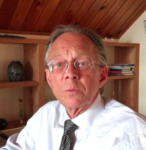
By HANS DUVEFELT, MD
My first job after residency was in a small mill town in central Maine. I joined two fifty something family doctors, one of whom was the son of the former town doctor. I felt like I was Dr. Kiley on “Marcus Welby, MD.” I didn’t have a motorcycle, but I did have a snazzy SAAB 900.
Will was a John Deere man, wore a flannel shirt and listened to A Prairie Home Companion. He was kind and methodical. Joe didn’t seem quite as rural, moved quicker and wore more formal clothes. I never could read his handwriting.
They each had their own patients, but covered seamlessly for each other. They were like a pair of spouses in the sense that they answered to each other as much as to their patients. They had to make everything work for the benefit of their shared practice, their shared livelihood. Their mutual loyalty was essential and obvious, although allowing for their differences in temperament and personalities.
Invited to stay on and enter into a partnership, I hesitated. How did I fit in? Could I follow in their footsteps and become an equal partner, covering for them and doing things similarly enough to fit in for the long haul?
In the end I declined and became an employed physician in the clinic I have been the Medical Director of, with some side forays, for decades.
Here, we are all employees, strangers brought here by chance, held together more loosely. We are all choosing to get along, but there isn’t the marriage-like commitment that Will and Joe had. We don’t arbitrate our differences in the same way; we, as a larger group, have the option of “doing our own thing” to a greater degree.
We do feel a strong loyalty to our growing but still small organization. Incoming providers paint a picture of what it is like to work for practices owned by much larger organizations, and in those it seems less obvious that doctors feel a deep commitment to their corporate mission.
Answering to the administration as much as, or more than, our colleagues makes it possible for us not to be team players. It also sets the stage for possible professional isolation. We must consciously cultivate clinical interchange and a collegial atmosphere.
In spite of all the talk about team based care, medical providers today are terribly isolated. There is no doctors lounge anywhere anymore. We are all collaborating with other staff categories, but not so much with each other.
There are virtual options for camaraderie and professional sharing, but with long clinic days and “pajama time” work from home, do we feel we have the time and energy for that?
I think we need to find ways to interact with each other at work. I seriously believe that this would be an investment with potentially huge return. Instead of working and eating at our desks or holing up to stare at our smartphones, and instead of giving up our lunches for structured meetings, we could eat lunch together and talk about tough cases, new things we’d like to try and challenges we face as modern medical providers.
If we talk more with each other, we can also develop a more shared vision of what we want out of our jobs for ourselves and our patients.
I’m talking about bringing back the Doctors Lounge…
Hans Duvefelt is a Swedish-born rural Family Physician in Maine. This post originally appeared on his blog, A Country Doctor Writes, here.

